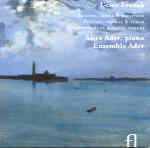César Franck’s Piano Quintet is one of those works that’s so powerful and emotionally complete as a listening experience that you wonder why it’s not played and recorded more frequently. Certainly it’s not an easy piece, and at nearly 40 minutes its three movements require plenty of concentration from both performers and audiences. Be that as it may, Alice Ader has assembled a group of string players completely at one with her view of how the work should go, and together they form a characterful ensemble fully dedicated to realizing the music’s textural variety and unique balance of light and shade.
I strongly doubt that the first movement has ever received a recording at once so cogent and dramatically gripping. The very first chord of the strings, rich with vibrato yet with a distinctly nasal twang that’s somehow very French, tells us that this team has the idiom in its blood. For the next 17 minutes the tension never lets up, with each episode organically shaped and projected with an ideal combination of rhythmic clarity and warmth. The lovely central Lento truly has the “molto sentimento” that Franck asks for, but it never turns excessively sticky, while the opening of the finale, with its creepy tremolo string ostinatos against the low tones of the piano, offers the ultimate in chamber music atmosphere. It really is a thrilling rendition of this major work, and if you care about great chamber music playing you simply must hear it.
The two solo piano works are no mere fillers. Anyone who knows Ader’s recordings of Debussy and Messiaen already understands just how perceptive a musician she is. More than her refined sense of keyboard color, she has an ability to project musical architecture through the phrasing of large paragraphs, which serves Franck particularly well. Thus, the two fugues build effortlessly from beginning to end, with exceptionally clear voicing and an unerring sense of where the music is going. Ader’s gentle touch in the concluding Variation of Op. 18 is simply magical, and her subtle exploitation of the harmonic tension in the middle section of the Prélude, Choral, et Fugue recalls Moravec in its confidence and eloquence. Rich, natural sonics, with perfect balances between piano and strings in the Quintet, round out a disc that connoisseurs will surely relish, but which deserves far more attention generally. Wonderful! [10/28/2005]
































